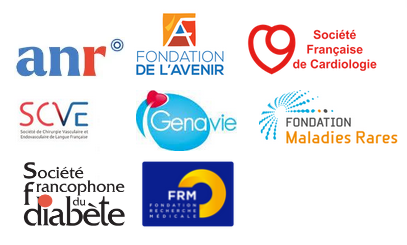Atherosclerosis and Vascular Calcification
Investigators : Thibaut Quillard, Sarah Beck, Laurent Beck, Blandine Maurel, Olivier Espitia
PhD students : Tom Le Corvec, Nathan Chaté, Marc Rio
Support staff : Marie-Aude Cheminant
Atherosclerosis and its complications remain the main cause of death worldwide. The clinical outcomes of atherosclerotic lesions (myocardial infarcts, stroke, acute ischemia of the limbs…) directly depend on their composition.
- In our group, we aim to better understand the physiopathology of atherosclerotic plaques formation and development. Atherosclerotic plaques can present various compositions. Such differences are often found between arterial beds, notably with carotid arteries developing typically lipid-rich and inflamed lesions, while femoral arteries mostly associate with fibrous and heavily calcified lesions. Because vascular cells (endothelial and smooth muscle cells) from these anatomical locations have specific transcriptomic signatures and identities, we will investigate how cardiovascular risk factor affect carotid and femoral vascular cell phenotypes and responses, and how this further translates into differential plaque development. Identification of molecular determinants implicated in these responses will help better understand atherosclerosis development, and will provide with novel therapeutic strategies based on lesion composition and localization. Our work will also study how hemodynamics impacts vascular cells phenotype, as carotid and femoral arteries are also exposed to specific blood flow dynamics.
- Calcification of atherosclerotic lesions is an independent predictive factor for cardiovascular complications and death, by affecting locally plaque stability, thrombus formation, endovascular treatment success, and more globally by greatly impacting vascular rigidity and vascular blood system resistance. In chronic kidney disease, hyperphosphatemia triggers calcification of the arterial wall which contribute to the development of cardiovascular diseases. There is still no treatment targeting this pathological process of vascular calcification in those two diseases, partly because the mechanisms underlying their formation and development are still poorly characterized. Thanks to our human biocollection of human atherosclerotic lesions and healthy arteries, and novel murine experimental models, we aim to identify new molecular players regulating this process and better understand the role(s) of the PiT1/SLC20A1 and PiT2/SLC20A2 proteins. These two proteins are at the crossroad of mineralization and metabolism, a role that we previously illustrated in investigating the relationship between skeleton, bone vessels and bone marrow adiposity. Deeper analysis of their involvement in adipose tissue (energy metabolism and thermogenesis) is currently ongoing through a collaborative work with Xavier Prieur (team IV).
- Primary Familial Brain Calcification (PFBC) is a neurodegenerative disease characterized by calcium-phosphate (Ca-Pi) deposits primarily in mural cells (MC) of brain micro-vessels, and associated with neuropsychiatric and motor disorders. So far, six genes have been associated to PFBC, and 2 of them - SLC20A2 and XPR1 - encode Pi transporters. We aim to characterize the role of brain MC in PFBC by using relevant mouse models and cutting-edge-technology of transcriptomics.
Learn more about our projects
- ANR PARKA : Laurent Beck (2021-2025)
- SFD PiTATHER : Sarah Beck-Cormier (2023-2025)
- FRM : Sarah Beck-Cormier (2024-2027)
Slc20a1 and Slc20a2 regulate neuronal plasticity and cognition independently of their phosphate transport ability. Mariana Ramos-Brossier, David Romeo-Guitart, Fabien Lanté, Valérie Boitez, François Mailliet, Soham Saha, Manon Rivagorda, Eleni Siopi, Ivan Nemazanyy, Christine Leroy, Stéphanie Moriceau, Sarah Beck-Cormier, Patrice Codogno, Alain Buisson, Laurent Beck, Gérard Friedlander, Franck Oury. Cell Death Dis. 2024 Jan
Phosphate in Cardiovascular Disease: From New Insights Into Molecular Mechanisms to Clinical Implications. Arterioscller. Thromb. Vasc. Biol. 2024 Jan
PiT2 deficiency prevents increase of bone marrow adipose tissue during skeletal maturation but not in OVX-induced osteoporosis. Giulia Frangi, Marie Guicheteau, Frederic Jacquot, Grzegorz Pyka, Greet Kerckhofs, Magalie Feyeux, Joëlle Veziers, Pierre Guihard, Boris Halgand, Sophie Sourice, Jérôme Guicheux, Xavier Prieur, Laurent Beck, Sarah Beck-Cormier. Front Endocrinol (Lausanne). 2022 Nov
Slc20a2, Encoding the Phosphate Transporter PiT2, Is an Important Genetic Determinant of Bone Quality and Strength. Sarah Beck-Cormier, Christopher J Lelliott, John G Logan, David T Lafont, Laure Merametdjian, Victoria D Leitch, Natalie C Butterfield, Hayley J Protheroe, Peter I Croucher, Paul A Baldock, Alina Gaultier-Lintia, Yves Maugars, Gael Nicolas, Christopher Banse, Sébastien Normant, Nicolas Magne, Emmanuel Gérardin, Nina Bon, Sophie Sourice, Jérôme Guicheux, Laurent Beck, Graham R Williams, J H Duncan Bassett. J Bone Miner Res. 2019 Jun
Identification of genomic differences among peripheral arterial beds in atherosclerotic and healthy arteries. Marja Steenman, Olivier Espitia, Blandine Maurel, Beatrice Guyomarch, Marie-Françoise Heymann, Marc-Antoine Pistorius, Benjamin Ory, Dominique Heymann, Rémi Houlgatte, Yann Gouëffic, Thibaut Quillard. Sci Rep. 2018 Mar
Funding
- Agence Nationale de la Recherche
- Fondation de l'Avenir
- Fondation Maladie Rare
- Fondation Recherche Médicale
- Genavie
- Société française de cardiologie
- Société Francophone du Diabète
- Société de Chirurgie Vasculaire et Endovasculaire de Langue Française

Mis à jour le 21 février 2025.





